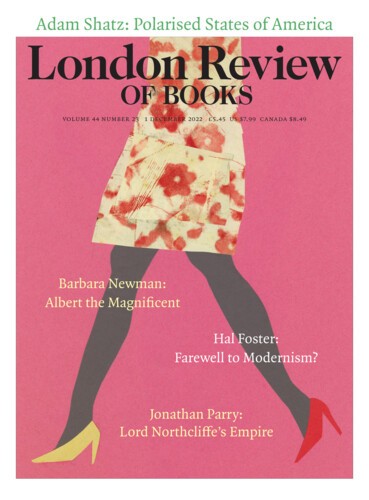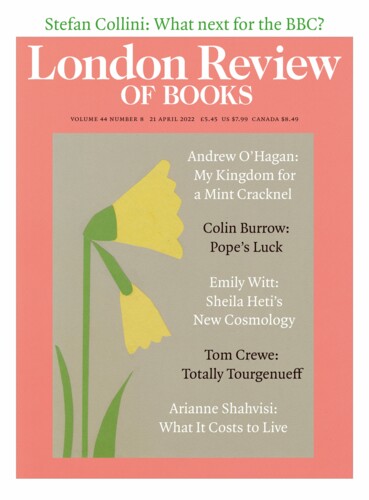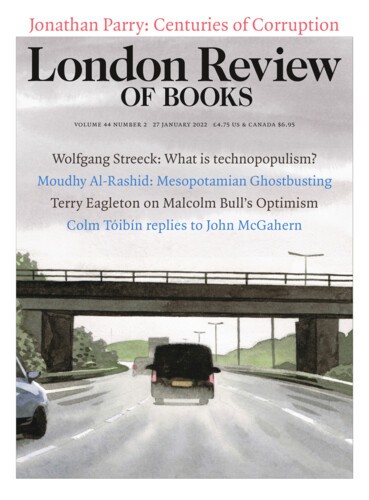Stefan Collini
Stefan Collini is the author of Absent Minds: Intellectuals in Britain, What Are Universities For? and The Nostalgic Imagination: History in English Criticism. His edition of Orwell’s Selected Essays was published in 2021. He is an emeritus professor of intellectual history and English literature at Cambridge.
Exaggerated Ambitions: The Case for Studying Literature
Stefan Collini, 1 December 2022
Teachers want to engage the interests of students, while, for larger political reasons, people want to encounter individuals who are in some major dimension ‘like’ themselves – whether as political representatives, or teachers, or, more ambiguously, as authors. Yet one of the most important functions of an education in a humanities subject is to introduce students to worlds that are different from the one they think they know, and chronological and cultural distance are among the most important forms of such difference. In some cases this argument may involve retaining traditional and now unfashionable texts; in others it may justify ‘rebalancing’ a selection by including historically neglected authors or genres. Either way, the search for ‘identification’ – with a character, a story or a writer – may be an incitement to youthful reading, but a too-easy endorsement of this quest soon impoverishes a syllabus.
Chimps and Bulldogs: The Huxley Inheritance
Stefan Collini, 8 September 2022
Not everyone has a chimpanzee named after them. When the primate ethologist Jane Goodall called one of the troop she studied in Tanzania ‘Huxley’, it was an affectionate tribute to her colleague Julian Huxley, distinguished biologist and prominent popular science writer. But observers (and perhaps other chimps) could be forgiven for thinking it was a reference to Thomas...
Beebology: What next for the BBC?
Stefan Collini, 21 April 2022
Attitudes to the BBC are, for the most part, spirit-sappingly predictable. Politicians of all parties believe it is biased against them. One powerful lobby claims it is a hotbed of radicals bent on undermining national identity, another that it is the mouthpiece of the establishment. Some critics denounce the licence fee as insulating the BBC against the bracing winds of competition, while others complain that the corporation has already abandoned its public service remit in the search for profit. One chorus takes up the theme that programming remains ‘elitist’ and ‘middle class’, another that it has become demotic and debased. Many people seem to feel that so long as The Archers and the shipping forecast are left untouched, then all is right with the world; others seem to think that the problem is precisely that The Archers and the shipping forecast have been left untouched for too long. It’s not easy to come up with any really new complaints about the BBC. Faced with this repetitive litany of charge and countercharge, what contribution can historians make?
Rapture in Southend: H.G. Wells’s Egotism
Stefan Collini, 27 January 2022
It can be hard, from this distance, to see what all the fuss was about. In his day (a day that, unfortunately for him, ended a decade or so before his death in 1946, a month short of his 80th birthday), H.G. Wells was one of the world’s leading literary and intellectual celebrities. Hailed as ‘a man of genius’ on the appearance of his breakthrough book, The Time Machine...
Podcasts & Videos
Anthony Wilks's film traces the connections between the events of Eric Hobsbawm’s life and the history he told, from his teenage years in Germany and his communist membership, to the jazz clubs of 1950s...
Early and Late Kermode
Stefan Collini, Mary-Kay Wilmers, Thomas Jones and Andrew O’Hagan
Stefan Collini talks to Thomas Jones about the life and work of Frank Kermode, and Mary-Kay Wilmers remembers him as a contributor to the LRB.
Pieces about Stefan Collini in the LRB
The Terrifying Vrooom: Empsonising
Colin Burrow, 15 July 2021
Reading an Empson essay is like being taken for a drive by an eccentric uncle in a terrifyingly powerful old banger. There are disturbing stains on the upholstery and an alarming whiff of whisky in the...
Is It Glamorous? Stefan Collini among the Intellectuals
David Simpson, 6 March 2008
George Orwell is commonly invoked as the ideal role model for the intellectual: feisty, independent, outspoken and contrarian, active in the public sphere, and famous. So it’s a surprise to...
Athenian View
Michael Brock, 12 March 1992
In seven of the nine chapters in this fine book Dr Collini depicts the denizens of the Athenaeum in its great days. T.H. Huxley, having left his umbrella at Matthew Arnold’s, asks his...
Burrinchini’s Spectre
Peter Clarke, 19 January 1984
Time was when Clio had a seamless garment: but that was before the division of labour set in. Prefixless history is now condescendingly thought of as ‘straight’ history and her...
Read anywhere with the London Review of Books app, available now from the App Store for Apple devices, Google Play for Android devices and Amazon for your Kindle Fire.
Sign up to our newsletter
For highlights from the latest issue, our archive and the blog, as well as news, events and exclusive promotions.




